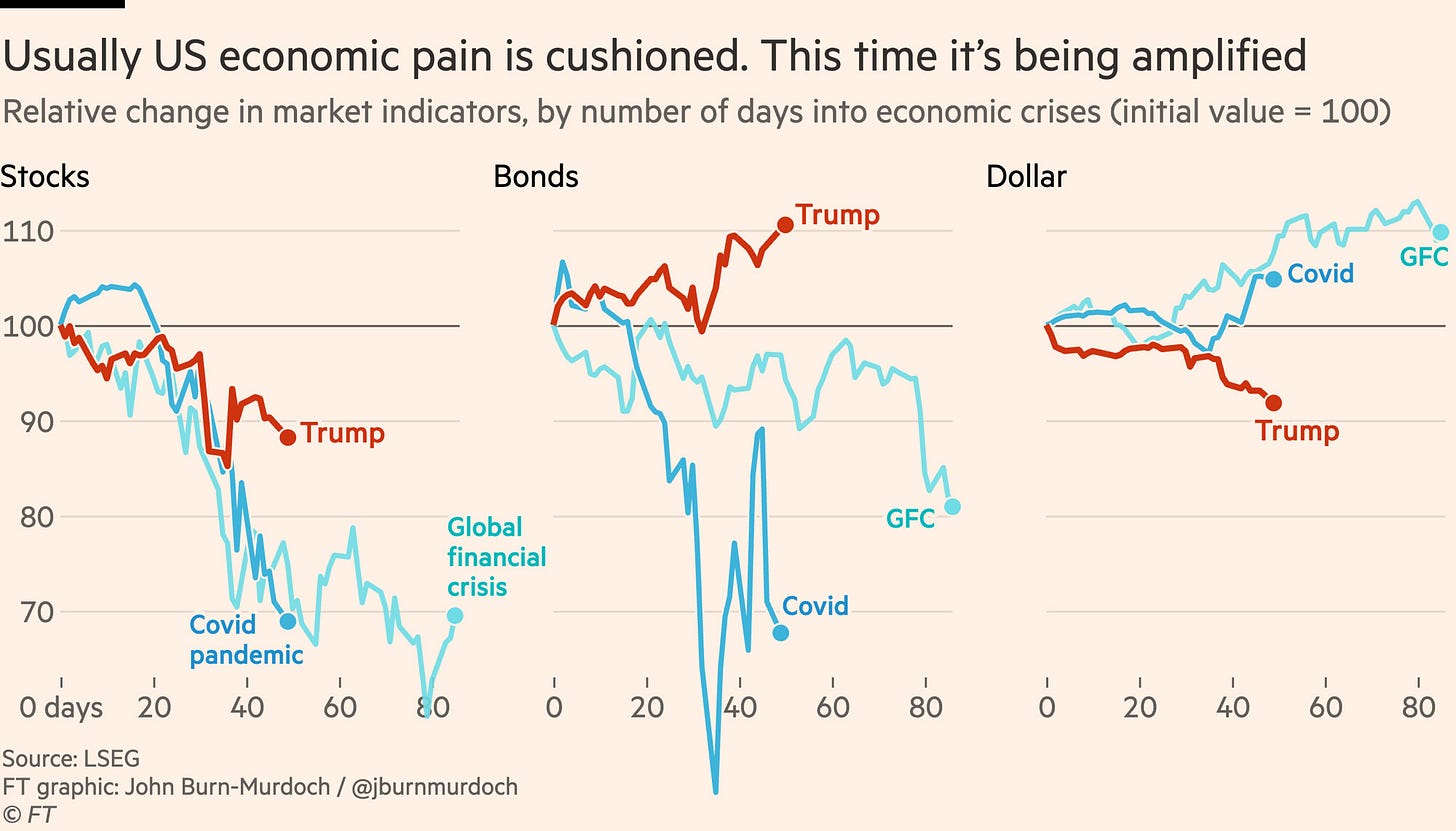It appears that I have two very different audiences for this blog. Some readers get very energized when I write about due process and the threats of the Trump Administrations to the Rule of Law. Other readers are more interested when I write about the adverse effect Trump is having on the economy.
It dawns on me, however, that the two topics are related. There is growing recognition in the financial markets that Trump’s apparent disregard for legal requirements such as due process has important implications for the risk of government bonds. Simply put, Trump’s dismissive view of legal requirements increases the risk of government bonds—resulting in a larger risk premium and higher bond rate.
It has long been understood that the rule of law is a key factor in setting the risk premium of government debt. Investors understand that a strong rule of law, including independent judiciaries, reduces the risk of default, and therefore demand a lower risk premium. The countries with a bad record on rule of law issues—such as Belarus and Sudan— have a huge country risk premium as a result.
The United States, with its strong tradition of rule of law, has long enjoyed a very low risk premium. While markets have imposed a risk premium on U.S. debt because of fiscal issues (such as the size of our national debt), they have not imposed any risk premium for rule of law issues.
But that may now be changing.
Reuters had a very interesting discussion of this last week:
The Trump administration’s other actions, such as its clashes with the judiciary, could over time erode confidence in U.S. institutional strength, a key pillar of foreign demand for U.S. assets, six analysts said.
A source at a major credit ratings agency, who requested anonymity to speak more candidly, said they were closely following developments that could point to an erosion of the rule of law in the country, which is relevant to how ratings agencies assess institutional strength - a key component of their credit risk views.
"There is investor concern that the administration is weakening institutional strength," said David Page, head of macro research at AXA Investment Management, an investment firm with nearly $1 trillion in assets under management.
Page pointed to concerns that the administration was failing to comply with court orders and officials, including Trump, were verbally attacking judges.
In addition, the markets are concerned with legal arguments by Trump that could lead to his control over the Federal Reserve:
Mehill Marku, lead geopolitical analyst at PGIM Fixed Income, a New Jersey-headquartered investment firm with $837 billion in assets under management, said investors were also watching Trump's expansive interpretation of his powers as President, a legal doctrine called the "unitary executive" theory.
"I'm sure investors are going to pay a lot more attention as we go forward in the so-called unitary presidency that clearly President Trump wants to establish, where everything goes through the White House," Marku said. "This is definitely a negative."
While the bond markets reacted very poorly to the Trump tariff announcement—and reacted positively when he delayed some of the tariffs—it is too soon detect a risk premium attributable to concerns about the rule of law. There are, however, certainly signs that the financial markets are growing concerned with Rule of Law issues. Today stocks fell, the dollar hit new lows and the yield on long term Treasuries rose. The Wall Street Journal attributed this in large part Trump’s threats to fire Federal Reserve chief Jerome Powell.
So what would this mean? If the financial markets demand a higher risk premium because of concerns about rule of law issues, bad things can happen to our economy. The Yale Budget Lab did an analysis last year of what would happen to the U.S. economy and found that “Even a relatively modest move in risk premia would have profound implications for the US. If the US country risk premium moved to that of the current UK level, after 10 years, real equity wealth per household would be $50,000 lower and real GDP 1% smaller. The erosion of safe harbor advantages could include more uncertainty and discontinuous risk, higher bond yields, and, ultimately, lower growth.”
So respect of the rule of law is not just about due process rights for immigrants and the protection of federal employees, law firms and universities from arbitrary government action. A further deterioration in respect for the rule of law can affect each of our bottom-lines as well.



Well said and so important. Thanks Chuck